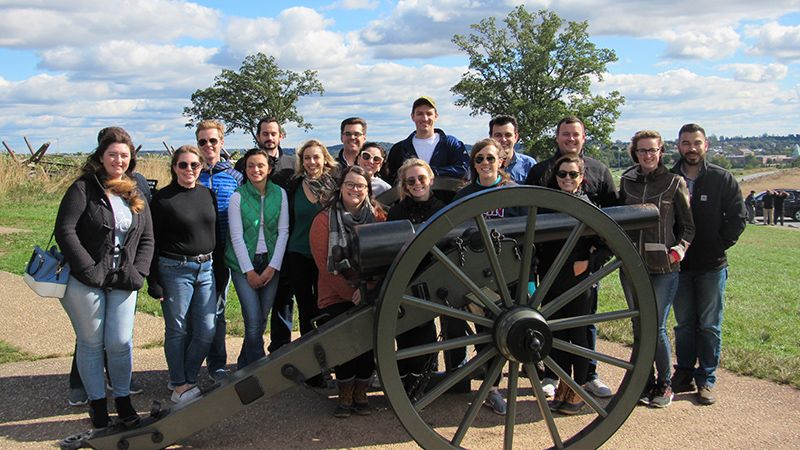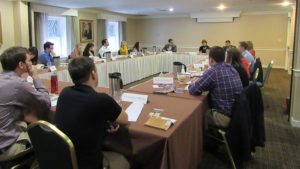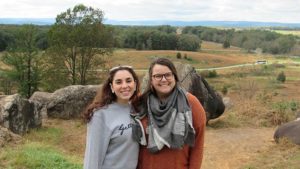
How can we solve the biggest problems facing our world today? The Fund for American Studies’ Public Policy Fellows searched for answers by examining one of America’s most contentious times in history – the Civil War – during a weekend retreat this fall.
Public Policy Fellows Fall Retreat in Gettysburg
On Oct. 12, the 2018-19 Public Policy Fellowship (PPF) participants arrived in Gettysburg, Pennsylvania, for a three-day public policy retreat during which they studied the Lincoln-Douglas debates and examined the underlying principles of public discourse in the lead up to the Civil War. Participants also explored Gettysburg’s history and significance in the Civil War through a guided battlefield tour.
Michael Finch (PPF 18), a legal associate with the Cato Institute’s Center for Constitutional Studies, said the weekend provided a stimulating symposium for discussion. “We engaged in open discussions about the enduring legacy of debate, its importance to self-government and the difficulty of balancing principles with practical government in the modern age.”

Dr. Colleen Sheehan, professor of politics and director of The Matthew J. Ryan Center at Villanova University, opened the conference with dinner remarks on, “The Motive and Mind of Lincoln” offering a brief history of the lead up to the Lincoln-Douglas debates. She detailed the legislative changes, as well as the shift in public opinion that prompted Lincoln to return to political life. The next day, the Fellows had the opportunity to discuss these ideas, engaging in two Socratic-style seminars on “Lincoln v. Douglas” and “Lincoln’s America.” The conversation focused on questions surrounding natural right, popular sovereignty, the rule of law and the role of prudence.
On Sunday, Dr. Allen Guelzo, the Henry R. Luce Professor of the Civil War Era and director of Civil War Era Studies at Gettysburg College, lectured on “Who Won the Lincoln-Douglas Debates?” relying on both polling results and the strength of their arguments to question which orator was victorious. He then moderated a conversation with the Fellows in which they discussed the tension between natural and civil rights and how that strain is still apparent in modern politics.
Lessons from the Civil War and Lincoln-Douglas Debates
The Civil War era was a unique time in America’s history during which it appeared as if the great experiment in self-government might fail. It was unclear if the body politic was truly dedicated to the principles laid out by the Founding Fathers. The war of words waged between Lincoln and Douglas in 1858 provides a substantive examination of those principles and the arguments opposed to them.

Then Republican candidate for U.S. Senator of Illinois, Abraham Lincoln, and incumbent Democratic Senator Stephen Douglas engaged in a series of seven debates across the state. Through each exchange, Lincoln and Douglas tried to persuade state legislators from the general assembly, who at that time elected state representatives, to vote for them. The primary issue was slavery, which would prove to be extremely important in both Illinois and national politics for years to come.
“Our trip to Gettysburg reopened a glimpse into America’s past for me,” said Melanie Benit (IEIA 14, PPF 18), activism manager at the Institute for Justice (IJ). “It showed me how close our ‘house’ came to dividing, yet, due to Lincoln’s moral fortitude in seeing slavery as the evil that it was, we were able to have a new birth of freedom.”
Finding an Answer in Civility
While Lincoln put up a concerted effort against Douglas, he eventually lost the Illinois Senate race. Despite this loss, his performance in the Lincoln-Douglas debates set him up to win a different election, the U.S. presidency, and eventually lead the country away from the evil practice of slavery. Although there are several different arguments pertaining to what caused the Civil War and why the North eventually prevailed, Fellows said they gained insight about the importance of civility in political dialogue from Lincoln’s example.
“It was really fascinating to engage in such disciplined and challenging dialogue in the calm manner that we did, while sitting in a place known for a raw violent battle,” said Benjamin Dierker (PPF 18), a student at George Mason’s Antonin Scalia Law School and Lone Star Policy Institute legal affairs associate. “In that way, I think Gettysburg is uniquely American. Like the revolution, bloodshed was necessary to preserve liberty and ensure that civility and dialogue could prosper for future generations.”
Brenda Hafera, coordinator of alumni programs and continuing education and director of PPF, said participants left the public policy retreat with a perspective on how the Lincoln-Douglas debates can inform many modern political debates of today.
The Fellows had the opportunity to examine the arguments of Lincoln and Douglas, discovering that the rhetoric of both individuals is still very much present in our modern debates. Such an examination is essential, for ideas which we do not deliberate quickly diminish and fade from our national character. As modern Americans have been gifted the legacy of the “experiment in self-government,” it is our duty to preserve the principles which the Founders espoused and Lincoln renewed.”
– Brenda Hafera, Director of the Public Policy Fellowship
Both discussion leaders focused on putting the Lincoln-Douglas debates into a modern context, underscoring the role of the citizen in public debate.
“Dr. Sheehan’s and Dr. Guelzo’s depth of knowledge on the Lincoln-Douglas debates provided me with a perspective that I had never considered, namely, that there are more similarities between our modern political environment and that of 1858 than one might initially imagine. Having the privilege of grappling with these questions just steps from where the Battle of Gettysburg took place was a humbling experience, and the public policy retreat served as a powerful reminder of our duty as citizens to uphold and defend the American experiment in self-government that we have been blessed to inherit,” said Kaytlin Roholt (PPF 18), a litigation and government regulation associate at Jones Day. “Our weekend in Gettysburg provided an unparalleled opportunity to study and debate some of the most important issues undergirding our constitutional system, including the role of natural law, the objectivity of moral truth, and the scope and source of natural rights.”
Public Policy Fellowship Program
Throughout their year-long fellowship, the Fellows will examine the challenges facing policy practitioners in achieving self-government, as well as the questions a free society must address in order to flourish and the unique advantages it can enjoy.
The annual fellowship is a networking and education program in Washington, D.C., designed to develop young leaders with a shared commitment to improving public policy. The goal of the program is to provide events, like the 2018 Public Policy Fellowship fall retreat in Gettysburg, that allow young professionals to foster strong connections with peers working in public policy, while building an understanding of the principles of government through deliberation and debate.
“This past weekend was invaluable to me, both practically and professionally,” said Josh Holdenreid (PPF 18), an associate director of coalition relations at The Heritage Foundation. “Never before had I done such a deep dive into the Lincoln-Douglas debates. Through Socratic seminars, my peers and I got the opportunity unpack not only the political and historical context of these debates, but also the challenges of balancing natural rights and popular sovereignty. I’m grateful to TFAS for such an experience, and look forward to learning more about America’s continuing experiment in self-government.”
The Fellows participate in discussions with public policy experts, academics and political leaders on topics fundamental to understanding the U.S. political system. At past retreats and seminars, Fellows have looked at America’s first freedoms and economics and leadership.
“This trip enabled me to reevaluate how much we, as a united nation, need to continue to remember what was said and what happened in Gettysburg to prevent our democracy from losing sight of our declaration again,” said Benit. “We reunited and affirmed our declaration of unalienable rights with democracy as the means to maintain them.”

